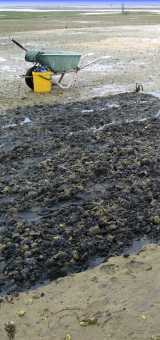Results summary
Restructuring of licensing scheme, to reduce the number of leases;
Encouraged farmers to experiment with alternative culture strategies, including mechanized harvest;
Evaluate the stocking density and area of natural seed beds;
Established an integrated, transparent disease monitoring scheme that also involves the stakeholders
Many growers lease small farms;
Mixed cohort plots are standard culture practice
Oyster culture in some areas of the Ria Formosa initially takes place on trestles, than they are placed on the sediment for growout;
Sources of seed are an issue for both clam and oyster culture;
Import of oyster seed from contaminated areas
Culture practice
Regular analysis of timing and spatial scale of mortality, to build up a multi-year (decadal) pattern of occurrence;
Implement regular mechanical mulching;
Identification of mortality episodes during/after periods of high precipitation
High summer mortality;
Stronger symptoms of gill disease (dermo) due to the protozoan pathogen Perkinsus marinus;
Excessive growth of opportunistic seaweeds such as Ulva, and seagrasses such as Zostera
Clam mortality

